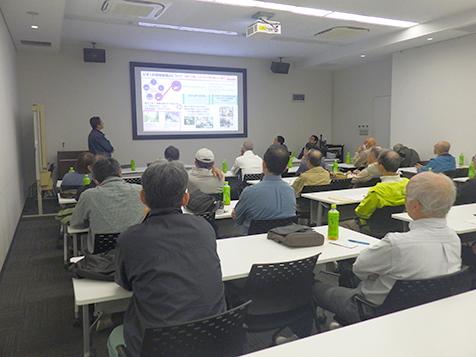- Sustainability TOP
- Environment
- Biodiversity Conservation
Biodiversity Conservation
Basic Approach
Isuzu Group's business activities both depend on the natural world, which nurtures biodiversity, and also have various impacts on it. Therefore, Isuzu Group has developed its Biodiversity Policy, referring to guidelines such as the Ministry of the Environment's Guidelines for Private Sector Engagement in Biodiversity and the Keidanren Declaration for Biodiversity. We are committed to promoting actions that harmonize biodiversity with our business activities to achieve a sustainable society.
To achieve the Aspiration of conserving native biodiversity outlined in Isuzu Environmental Vision 2050, we work in collaboration with NGOs and other stakeholders to conserve the native biodiversity in the areas surrounding Isuzu Group operations. Additionally, Isuzu has supported the Keidanren Declaration for Biodiversity since January 2020.
| Isuzu Environmental Vision 2050 | 2030 Environmental Roadmap | |
|---|---|---|
| Aspiration | 2030 Challenge | Global Action |
Conserve native biodiversity in local communities |
|
|
Isuzu Group Policy on Biodiversity (Formulated in 2018)
Basic Vision
We, the Isuzu Group, understand the relationship all of our business activities have with the ecosystem.
We support action that helps achieve a sustainable society through a harmony of business activities and biodiversity.
Action Guidelines
- Each employee learns and has an understanding that our business activities are enabled by biodiversity and at the same time, are affecting it.
- We engage in activities that reduce our impact on biodiversity and protect it in all of our business activities.
- We protect biodiversity from a global perspective, taking into account the diversity of local communities.
- We promote cooperation and collaboration with our stakeholders in order to improve our conservation activities.
- We contribute to local communities, placing valuing on communication and cooperation with stakeholders through disclosing information on activities and other initiatives.
Initiatives
Assessment of Dependency and Impact on Nature
Isuzu uses the tool ENCORE*1 to understand the extent of our dependence and impact on nature. We have assessed these dependencies and impacts throughout our value chain and created a heatmap. Moving forward, we will advance the evaluation of risks and opportunities related to natural capital based on these results and our business operations.
For raw material procurement, we will enhance engagement with our business partners through communication on reducing environmental impact and GHG emissions. For manufacturing and use, we aim to reduce risks and seize opportunities through initiatives aligned with our 2030 Environmental Roadmap.
Heatmap of Dependencies*2
| Ecosystem services directly provided | Ecosystem services that enhance production processes | Ecosystem services that mitigate direct impacts | Ecosystem services that protect from disturbances | |||||||||||||||||
|---|---|---|---|---|---|---|---|---|---|---|---|---|---|---|---|---|---|---|---|---|
| Animal-derived energy | Natural materials such as fibers | Genetic resources | Groundwater | Surface water | Pollination | Soil quality | Ventilation | Water circulation | Water quality | Breakdown of pollutants by organisms | Dilution function by air and water | Filtration function | Noise and light pollution reduction | Flow regulation | Climate regulation | Disease reduction | Protection from floods and wind | Erosion prevention by vegetation | Pest control | |
| Raw material procurement | ||||||||||||||||||||
| Manufacturing | ||||||||||||||||||||
| Usage | ||||||||||||||||||||
-
- Low
- Medium
- High
Heatmap of Impacts*2
| Land-use change | Direct extraction | Climate change | Pollution | Other | |||||||
|---|---|---|---|---|---|---|---|---|---|---|---|
| Land use | Freshwater use | Marine use | Water use | Other resource use | GHG emissions | Air pollution | Water pollution | Soil pollution | Waste | Noise and light pollution, etc. | |
| Raw material procurement | |||||||||||
| Manufacturing | |||||||||||
| Usage | |||||||||||
-
- Low
- Medium
- High
- *1Exploring Natural Capital Opportunities, Risks, and Exposure
- *2Regarding raw material procurement, since various raw materials (such as petroleum, minerals, glass, natural rubber) and procurement processes (such as chemicals, metals, electronic components, tires) are involved, we take care to adopt those with significant levels of dependency and impact to ensure that we do not underestimate the degree of dependence and impact.
Promoting Biodiversity Conservation Efforts
Isuzu is working on biodiversity conservation activities at its Fujisawa and Tochigi Plants in collaboration with nearby universities.
Since 2013, Isuzu began conducting surveys of the flora and fauna on its plant premises. The results revealed that at both plants, insufficient forest maintenance was causing imbalances in the ecosystem and an overgrowth of invasive species, weakening the public functions of the satoyama (traditional rural landscapes). Based on advice from the universities, we have been maintaining the plant sites since fiscal 2017, including developing areas where native species can thrive. Since 2017, annual surveys have confirmed a decrease in invasive species and a trend towards improving the imbalance in the ecosystem.
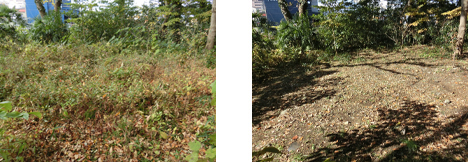
Fujisawa Plant: Maintaining the site's forested area
(Left: Before, Right: After)
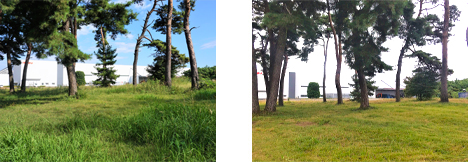
Tochigi Plant: Maintaining the site's greenery area
(Left: Before, Right: After)
Promoting Efforts to Protect Local Ecosystems
We promote efforts to protect regional ecosystems in local communities where we conduct business, working to conserve them along with their biodiversity. In addition, by encouraging these activities across the entire Isuzu Group, we remain committed to protecting global biodiversity.
Watarase-yusuichi Conservation Activities
Since 2016, Isuzu has been involved in conservation activities at the Watarase-yusuichi near its Tochigi Plant.
The Watarase-yusuichi is the largest reservoir area in Japan and is a Ramsar-registered wetland that serves an important flood control function to prevent flood damage in the region. Isuzu, along with volunteers from its Tochigi Plant, nearby Group companies, and their families, participates in activities such as reed cutting, removal of invasive plants, and litter cleanup, organized by local governments and NPOs. The ongoing conservation activities conducted with local residents have borne fruit and storks have been seen flying and nesting in the Watarase-yusuichi.
In fiscal 2022, Isuzu was recognized as an Environmental Conservation Organization by Tochigi City. Additionally, for four consecutive years, from fiscal 2022 to fiscal 2025, Isuzu received letters of appreciation from Oyama City as a Watarase-yusuichi Conservation Support Organization.
Furthermore, the Tochigi Plant is involved in tree planting activities in Ashio, located upstream along the Watarase River, which flows into the Watarase-yusuichi. Ashio was once devastated by smoke pollution from copper smelting, leading to the deforestation of the surrounding mountains. By participating in reforestation efforts, Isuzu aims to create opportunities for learning about environmental conservation through activities both upstream and downstream.
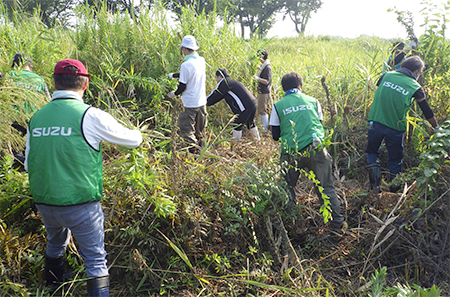
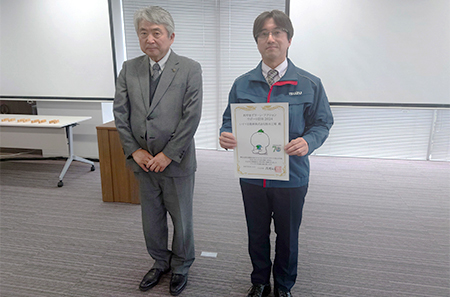
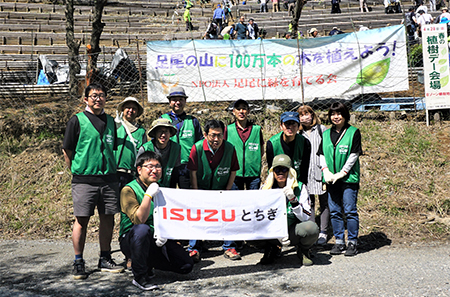
Participating in Activities to Develop Forests That Supply Water in Kanagawa Prefecture
Since fiscal 2019, the Isuzu Fujisawa Plant has been participating in Kanagawa Prefecture's Forest Restoration Partner project, conducting conservation activities to protect the forests in the Ashigarakami District that serve as the water source for the groundwater used by the plant.
Since fiscal 2020, Group companies within the Fujisawa Plant have also joined these efforts. Through thinning work to restore neglected forests to a healthy state and nature observation activities, participants are reminded of the importance of biodiversity and the significance of preserving the forests that serve as water sources.
Although activities were suspended in fiscal 2021 and fiscal 2022 to prevent the spread of COVID-19, they resumed in fiscal 2023. In November 2024, 20 employees from three companies and their familes participated in the conservation activities.
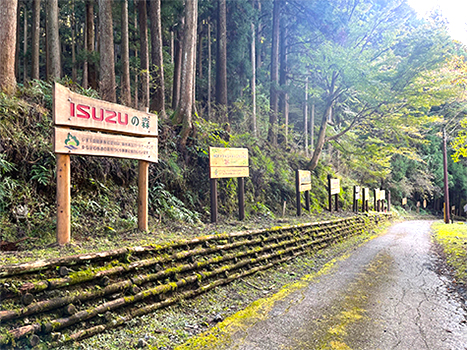
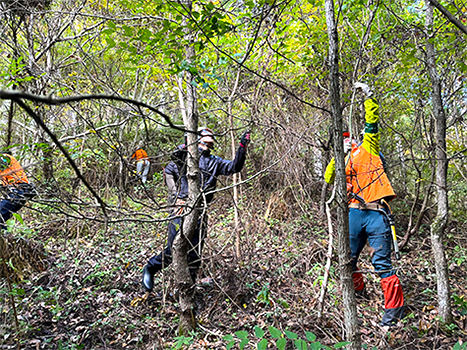
Isuzu Plaza's Biotope
At Isuzu Plaza, a biotope has been established to replicate the unique ecosystem of the Fujisawa region, where the plaza is located. Since fiscal 2020, we have been collaborating with local university research labs. Our efforts include improvements like revising tree signage content to create a biotope that serves as a place of relaxation for the community, allowing everyone to feel closer to nature. We are actively seeking various pieces of advice to achieve this goal.
We encourage students to utilize this space for fieldwork and as a practical platform for considering community coexistence. We also provide them with opportunities to present their research findings to Isuzu. Additionally, employees are discovering the significance of ecosystem conservation afresh, while drawing inspiration from the innovative ideas of the students.
Promoting Sustainable Procurement
Adoption of Environmentally Friendly Materials
Isuzu has replaced traditional wood used for truck beds with bamboo, a member of the grass family, in consideration of forest conservation.
Bamboo, with its fast growth rate that allows it to be used as a material in about five years, along with its excellent durability, is considered a suitable material for truck beds.
Bamboo flooring material is being used in many vehicle models, including the new ELF released in March 2023.

Developing Human Resources to Build a Society in Harmony with Nature
Isuzu has been conducting regular environmental education for employees since fiscal 2017 to raise environmental awareness and deepen understanding of Isuzu's environmental activities.
This education is provided through a combination of e-learning and in-person training, which also helps reduce CO2 emissions associated with employee travel.
Starting in fiscal 2024, Isuzu introduced common environmental education for executives and personnel responsible for environmental activities across the entire Isuzu Group. This initiative aims to enhance understanding of Isuzu Environmental Vision 2050 and 2030 Environmental Roadmap. This activity will be expanded to all Isuzu Group employees in the future, facilitating human resource development so that each member of the Isuzu Group can contribute to the realization of Isuzu Environmental Vision 2050 alongside our customers and partners.
Communication with the Local Community Surrounding the Plant
At the Isuzu Fujisawa Plant, we provide an opportunity for members of local residents' associations from six neighboring areas to learn about Isuzu's and the Fujisawa Plant's environmental conservation initiatives.
In November 2024, 31 participants attended the event.
